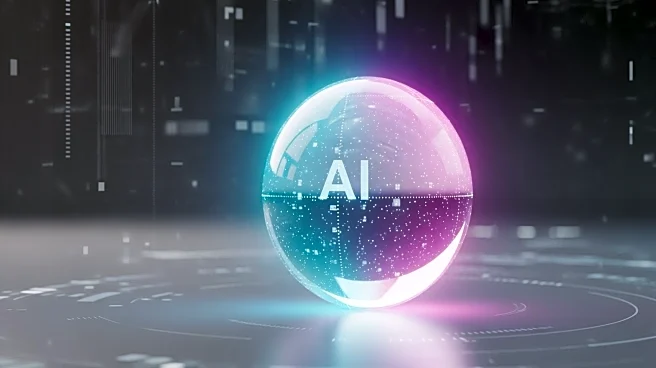What's Happening?
Prominent figures in the tech industry, including Sam Altman and Mark Zuckerberg, have expressed concerns about a potential bubble in artificial intelligence (AI). Altman acknowledges the existence of
an AI bubble, albeit one based on a 'kernel of truth,' while Zuckerberg suggests that the bubble's impact depends on the continued growth of AI capabilities and demand. The discussion centers around the uncertainty of how and when this bubble might burst, with scenarios ranging from a decline in interest in large language models (LLMs) to a significant drop in tech company stock prices. The article highlights the current state of AI as a 'bubble technology,' characterized by constant change and the potential for either societal disruption or significant wealth generation.
Why It's Important?
The potential bursting of the AI bubble could have significant implications for the tech industry and the broader economy. If the bubble bursts, it could lead to a reevaluation of AI's role in society and its economic value, potentially affecting investments and innovation in the sector. Companies heavily invested in AI, such as OpenAI, Nvidia, and Google, could face financial challenges, impacting their operations and market positions. Additionally, the shift from conferences to blogging as a measure of AI's normalization suggests a transition from hype to practical application, which could stabilize the industry and lead to more sustainable growth. Stakeholders, including investors, tech companies, and policymakers, must consider these potential outcomes as they navigate the evolving AI landscape.
What's Next?
As the AI industry continues to evolve, stakeholders will likely monitor the balance between conferences and blogging as an indicator of AI's normalization. A shift towards more technical blogging could signal a stabilization of the industry, reducing the volatility associated with bubble technologies. Companies may need to adjust their strategies to focus on sustainable growth and practical applications of AI, rather than speculative investments. Policymakers might also consider regulatory measures to address potential risks associated with AI's rapid development and its impact on society. The tech community will continue to engage in discussions and debates about AI's future, shaping the direction of innovation and investment in the field.
Beyond the Headlines
The ethical and societal implications of AI's potential bubble are significant. As AI technologies become more integrated into daily life, questions about privacy, security, and the ethical use of AI will become increasingly important. The potential for AI to disrupt traditional industries and job markets also raises concerns about economic inequality and the need for workforce retraining. Additionally, the global competition for AI dominance, particularly between the U.S. and China, could influence geopolitical dynamics and international relations. These broader implications highlight the need for a comprehensive approach to AI development that considers not only economic factors but also ethical and societal impacts.










